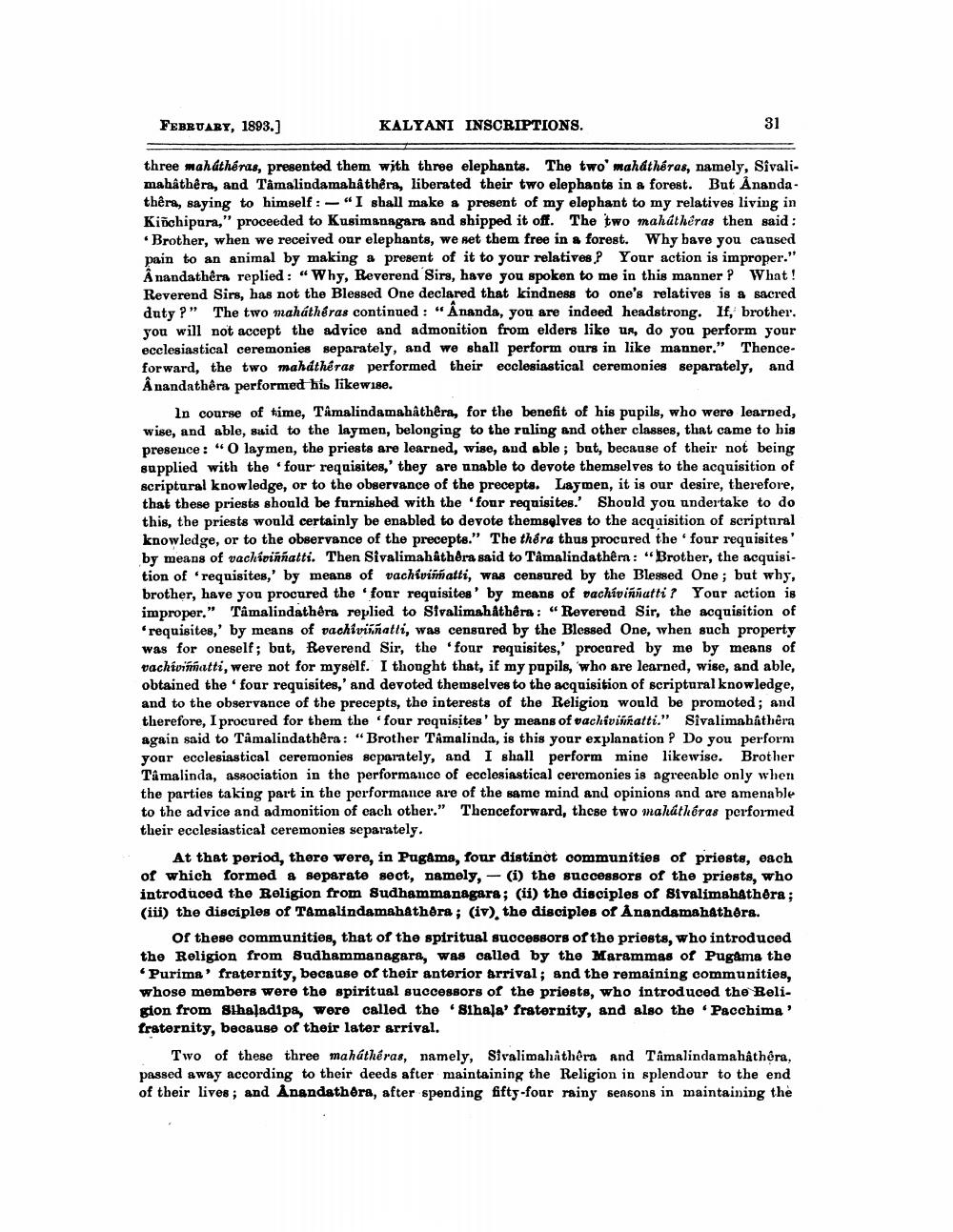________________
FEBRUARY, 1893.]
KALYANI INSCRIPTIONS.
31
three maháthéras, presented them with three elephants. The two mahathéras, namely, Sivalimahâthêra, and Tâmalindamahâthêra, liberated their two elephants in a forest. But Anandathêra, saying to himself :-“I shall make a present of my elephant to my relatives living in Kiñchipara," proceeded to Kusimanagara and shipped it off. The two mahấthéras then said: • Brother, when we received our elephants, we get them free in a forest. Why bave you caused pain to an animal by making a present of it to your relatives? Your action is improper." Â nandathêrs replied: “Why, Reverend Sirs, have you spoken to me in this manner P What! Reverend Sirs, has not the Blessed One declared that kindness to one's relatives is a sacred duty ?" The two maháthéras continued : “Ananda, you are indeed headstrong. If, brother. you will not accept the advice and admonition from elders like us, do you perform your ecclesiastical ceremonies separately, and we shall perform ours in like manner." Thenceforward, the two mahdthéras performed their ecclesiastical ceremonies separately, and Anandathêra performed his likewise.
In course of time, Tamalindamahâthêra, for the benefit of his pupils, who were learned, wise, and able, said to the laymen, belonging to the ruling and other classes, that came to his presence: "Olaymen, the priests are learned, wise, and able; but, because of their not being supplied with the four requisites,' they are unable to devote themselves to the acquisition of scriptural knowledge, or to the observance of the precepts. Laymen, it is our desire, therefore, that these priests should be furnished with the four requisites. Should you undertake to do this, the priests would certainly be enabled to devote themselves to the acquisition of scriptural knowledge, or to the observance of the precepts." The théra thus procured the four requisites' by means of vachipinnatti. Then Sivalimaháthêra said to Tamalindathêm: "Brother, the acquisition of requisites,' by means of vachiviimatti, was censured by the Blessed One; but why, brother, have you procured the four requisites' by means of vachíviññatti? Your action is improper." Tâmalindathêra replied to Sivalimah åthêra: "Reverend Sir, the acquisition of requisites,' by means of vachiviinatti, was censured by the Blessed One, when such property was for oneself; but, Reverend Sir, the four requisites, procared by me by means of vachiviñatti, were not for myself. I thought that, if my pupils, who are learned, wise, and able, obtained the 'four requisites,' and devoted themselves to the acquisition of scriptural knowledge, and to the observance of the precepts, the interests of the Religion would be promoted; and therefore, I procured for them the 'four requisites' by means of vachívithatti." Sivalimahấthêra again said to Tamalindathêra: "Brother Tamalinda, is this your explanation ? Do you perform your ecclesiastical ceremonies separately, and I shall perform mine likewise. Brother Támalinda, association in the performance of ecclesiastical ceremonies is agreeable only when the parties taking part in the performance are of the same mind and opinions and are amenable to the advice and admonition of each other." Thenceforward, these two maháthéras performed their ecclesiastical ceremonies separately.
At that period, there were, in Pugams, four distinct communities of priests, each of which formed a separate sect, namely, - (i) the successors of the priests, who introduced the Religion from Sudhammanagara; (ii) the disciples of Sivalimahathéra; (iii) the disciples of Tamalindamahathdra; (iv), the disciples of Anandamahathéra.
of these communities, that of the spiritual successors of the priests, who introduced the Religion from Sudhammanagara, was called by the Marammas of Pugama the
Purima' fraternity, because of their anterior arrival; and the remaining communities, whose members were the spiritual successors of the priests, who introduced the Religion from Sthaladipa, were called the 'Sihala' fraternity, and also the Pacchima' fraternity, because of their later arrival.
Two of these three maháthéras, namely, Sivalimahithérn And Tîmalinda mahathêra, passed away according to their deeds after maintaining the Religion in splendour to the end of their lives; and Anandathéra, after spending fifty-four rainy seasons in maintaining the




